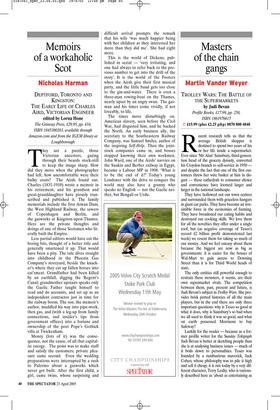Memoirs of a workaholic Scot
Nicholas Harman
DEPTFORD, TORONTO AND KINGSTON: THE EARLY LIFE OF CHARLES AIRD, VICTORIAN ENGINEER edited by Lorna Hone The Grimsay Press, £29.95, pp. 434, ISBN 1845300203, available through Amazon.com and from the IGEM library at Loughborough They are a puzzle, those Victorian ancestors, gazing through their beards stock-still to keep the image sharp. How did they move when the photographer had left, how uncomfortable were their bulky coats? The Airds found out. Charles (1831-1910) wrote a memoir in his retirement, and his grandson and great-granddaughter have piously transcribed and published it. The family memorials include the first Aswan Dam, the West Highland Railway, the sewers of Copenhagen and Berlin, and the gasworks at Kingston-upon-Thames. Here are the private thoughts and doings of one of those Scotsmen who literally built the Empire.
Less partial editors would have cut the boring bits, thought of a better title and generally smartened it up. That would have been a pity. The tale dives straight into childhood in the Phoenix Gas Company’s storeyard, beside the knacker’s where they cut up fallen horses into cat’smeat. Grandfather had been killed by an earthfall, digging the Regent’s Canal; grandmother upstairs speaks only the Gaelic. Father taught himself to read and do accounts, and set up as an independent contractor just in time for the railway boom. The son, the memoir’s author, muddled his way into pipe-work, then gas, and (with a leg-up from family connections, and insider’s tips from government offices) into a fortune and ownership of the poet Pope’s Gothick villa at Twickenham.
Money (lots of it) was the consequence, not the cause, of all that capitalist energy. The point was to make stuff and satisfy the customers; private pleasure came second. Even the wedding preparations were interrupted by a rush to Palermo about a gasworks which never got built. After the first child, a girl, came twins, whose surprising and difficult arrival prompts the remark that his wife ‘was much happier being with her children as they interested her more than they did me’. She had eight more.
This is the world of Dickens, published in serial — ‘very irritating, and one had always to refer back to the previous number to get into the drift of the story’. It is the world of the Pooters when the Airds give their first musical party, and the little band gets too close to the gin-and-water. There is even a three-man rowing-boat on the Thames, nearly upset by an angry swan. The gasman and his times come vividly, if not loveably, to life.
The times move disturbingly on. American slavery, seen before the Civil War, had disgusted him, and he backed the North. An early business ally, the secretary to the Southeastern Railway Company, was Samuel Smiles, author of the inspiring Self-Help. Then the jointstock companies came in, and bosses stopped knowing their own workmen. John Ward, one of the Airds’ navvies on the Suakin and Berber railway in Egypt, became a Labour MP in 1908: ‘What is to be the end of it?’ Today’s young Londoner with the drive to conquer the world may also have a granny who speaks no English — nor the Gaelic neither, but Bengali or Urdu.



















































 Previous page
Previous page